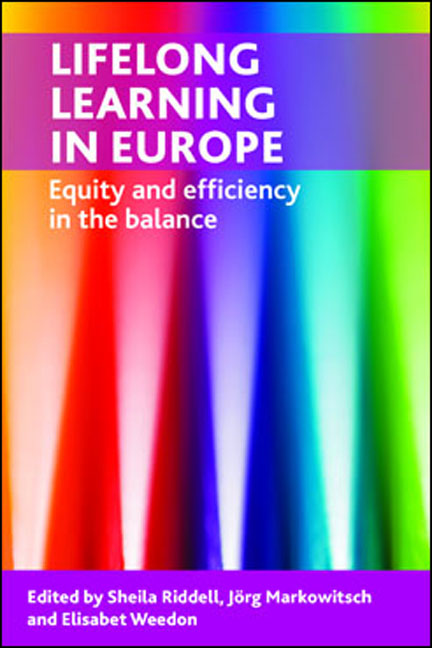Book contents
- Frontmatter
- Contents
- List of figures, tables and case studies
- Notes on contributors
- List of contributors, by country, to the EU Sixth Framework Project ‘Towards a Lifelong Learning Society in Europe: The Contribution of the Education System’ (LLL2010)
- one Lifelong learning and the generation of human and social capital
- two Lifelong learning and the wider European socioeconomic context
- three Neoliberal and inclusive themes in European lifelong learning policy
- four Formal adult education in the spotlight: profiles, motivations and experiences of participants in 12 European countries
- five The sociodemographic obstacles to participating in lifelong learning across Europe
- six The qualification-providing enterprise? Support for formal adult education in small and medium-sized enterprises
- seven Reducing or reinforcing inequality: assessing the impact of European policy on widening access to higher education
- eight Conclusion: the role of lifelong learning in reducing social inequality at a time of economic crisis
- Technical annex to Chapter Four
- Glossary of terms and abbreviations
- Index
six - The qualification-providing enterprise? Support for formal adult education in small and medium-sized enterprises
Published online by Cambridge University Press: 01 September 2022
- Frontmatter
- Contents
- List of figures, tables and case studies
- Notes on contributors
- List of contributors, by country, to the EU Sixth Framework Project ‘Towards a Lifelong Learning Society in Europe: The Contribution of the Education System’ (LLL2010)
- one Lifelong learning and the generation of human and social capital
- two Lifelong learning and the wider European socioeconomic context
- three Neoliberal and inclusive themes in European lifelong learning policy
- four Formal adult education in the spotlight: profiles, motivations and experiences of participants in 12 European countries
- five The sociodemographic obstacles to participating in lifelong learning across Europe
- six The qualification-providing enterprise? Support for formal adult education in small and medium-sized enterprises
- seven Reducing or reinforcing inequality: assessing the impact of European policy on widening access to higher education
- eight Conclusion: the role of lifelong learning in reducing social inequality at a time of economic crisis
- Technical annex to Chapter Four
- Glossary of terms and abbreviations
- Index
Summary
Introduction
Various fields of research deal with formal adult education, but it does not feature prominently in the literature on company training, human resource development (HRD) or adult education. Particularly in countries such as Austria, with strong occupational labour markets, it is expected that formal education will have been completed before entering the world of work. In other countries, such as the UK, although an applicant would be expected to have the basic qualifications necessary for the job, undertaking additional qualifications while in post is common.
This chapter seeks to make two contributions. First, we investigate whether formal adult education occupies a separate domain within companies’ training activities and human resource management. Managers distinguish between formal and non-formal education and training; however, in some countries, these boundaries are more blurred than in others (Hefler, 2010, Chapter 7). To investigate formal adult education's significance at the company level, an enterprise's practices with regard to formal adult education must be distinguished from its more general approaches to training and HRD. Consequently, we first analyse formal adult education separately from more general patterns of training, so that we can assess whether it shows significant independence. Second, we work towards a comparative framework, by identifying differences in the significance of formal adult education in the European corporate training context. We do this by taking a broad view that reflects statistical and case study evidence for 12 of the 13 LLL2010 project countries.
In corporate training, the organisation initiates and decides on participation, course content and purpose of the training. Employees may be asked for their personal interests in appraisal interviews and organisations may act to motivate their staff to take courses. Enterprises presumably choose the training in line with their particular interests, and employees participate in the training arranged as part of their duties, typically within paid working time and at their employer's expense.
For formal adult education, the praxis is more complex. In many cases, the employee unilaterally decides to participate; the employer must accept and deal with this decision, comparable to other important life events such as parental leave or extended periods of illness. Often participation ranks high among personal values, so that workers may opt to undertake a course even if this involves leaving their present job.
- Type
- Chapter
- Information
- Lifelong Learning in EuropeEquity and Efficiency in the Balance, pp. 103 - 124Publisher: Bristol University PressPrint publication year: 2012



